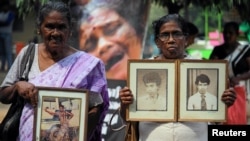Sri Lanka's prime minister said Wednesday that the government has decided to withdraw from co-sponsorship of a 2015 U.N. Human Rights Council resolution calling for the investigation of allegations of war crimes committed during the island nation's long civil war.
Prime Minister Mahinda Rajapaksa's announcement comes days after the U.S. State Department imposed a travel ban on Sri Lanka's army commander, Shavendra Silva, and his family over alleged human rights violations in the final stages of the civil war in 2009.
“The people should be the judge of how fair this is,” Rajapaksa said. “Even though this collective punishment has been meted out on the grounds that the army commander had committed violations of human rights, no one knows what these allegations are.”
Rajapaksa said the resolution has enabled other countries to blame members of Sri Lanka's armed forces for being human rights violators.
According to a 2015 report by the office of the U.N. high commissioner for human rights, Silva had been tasked with freeing Puthumattalan, one of the last strongholds of the now-defeated Tamil Tiger rebels. The investigation cited witnesses as saying the army unit he was leading shelled a hospital and a U.N. hub.
Silva has denied targeting hospitals in his statement to a government-appointed commission, saying that the facility was being used to treat rebel fighters, the report said.
Foreign ministry officials could not be immediately reached Wednesday for comment on Rajapaksa's announcement.
Sri Lanka co-sponsored a resolution at the U.N. Human Rights Council along with 11 other countries calling for the investigation of allegations of wartime atrocities by both government forces and the Tamil Tiger rebels, who were fighting for a separate homeland for Sri Lanka's ethnic Tamil minority. The U.S., Britain, Australia and Germany were also among the co-sponsors.
As Sri Lanka's president, Rajapaksa oversaw a military campaign that crushed the Tamil Tigers in May 2009 to end the 26-year civil war. According to conservative U.N. estimates, some 100,000 people were killed in the war.
The government of Rajapaksa's successor, Maithripala Sirisena, co-sponsored the resolution in 2015, but current President Gotabaya Rajapaksa, a younger brother of Mahinda Rajapaksa, promised to withdraw from the resolution ahead of the presidential election last November.
Sri Lanka to Withdraw From UN Rights Resolution




